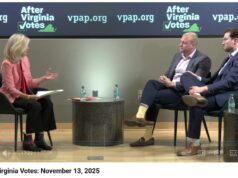Virginia just completed a session that has been described in superlative, even historic terms. For instance, see:
- Virginia reshaped as Democrats put historic stamp on laws (“Lawmakers wrapped up this year’s session Sunday — apart from passing the state budget — after advancing the South’s strictest gun laws, broadest LGBTQ protections and some of its loosest abortion restrictions. Democrats had not had full control of the legislature for more than two decades, and their years of pent-up frustrations yielded one of the most consequential sessions in Virginia’s history.”)
- Virginia House Democrats Celebrate Historic Legislative Accomplishments
- AG Mark Herring’s Legislative Package Helps Make 2020 Most Progressive Legislative Session in Virginia History
So now, with the General Assembly calling it a wrap on the 2020 session – other than finishing up the budget and possibly a few odds and ends on Thursday – it’s time to start assessing what happened, what worked (and what didn’t work), who emerged as leaders (and who flopped), who were the most (and least) progressive members of the General Assembly (on that front, stay tuned for VAPLAN‘s scorecard), what were possible “lessons learned,” etc.
For the moment, here’s one potential “lesson learned” that jumps out at me: namely, that what just happened in Virginia in November 2019 – when Democrats won majorities in both the House of Delegates and State Senate – and in January-March 2020 – when those Democratic majorities got to work and passed a ton of legislation – should be examined by national Democrats heading into November 2020 and a possible federal level Democratic “trifecta” in 2021. How so?
First of all, keep in mind that Virginia is, in many ways, a microcosm of the nation – see here for a lot more on that topic – so that what happens here actually *could* plausibly contain lessons for the country as a whole, in a way that wouldn’t be the case for, let’s say, North Dakota or whatever.
Second, of course, what Virginia has showed since 2017, in non-debatable terms, is that elections – and not just federal, but also state and local elections – really matter. A lot. As does which party holds power. And, frankly, anyone who argues otherwise should immediately be ignored on everything else, because they’re just so wrong on such a fundamental point about the way this country – and specifically its political system – works. In the case of Virginia, just compare/contrast the massive difference between the vast array of progressive and environmental legislation passed this session – with Democrats holding the covered (and relatively rare) “trifecta” (the Governor’s Mansion, the House of Delegates and the State Senate) – and the almost total absence of progressive and environmental legislation for the past…seemingly forever, with Republicans controlling at least one chamber of the legislature. It’s truly stark.
Third, as a possible lesson for what might happen in November 2020 and beyond, note that Democrats in Virginia barely took control of the State Senate (a likely outcome for the U.S. Senate as well); that the State Senate is the more conservative body relative to the House of Delegates (very similar to the U.S. Senate relative to the U.S. House of Representatives); that we’ve got a relatively “moderate” Democrat as governor, one with years of experience in the State Senate (sound familiar, assuming Joe Biden wins the presidency in November?); and that we’ve got a relatively comfortable, relatively progressive majority in the House of Delegates (again, very similar to the U.S. House of Representatives).
Fourth, here in Virginia, we had a strong grassroots presence, both in winning the Democratic majorities in the first place, but also in fighting for progressive and environmental legislation. Of course, this hasn’t always gone smoothly, and it certainly hasn’t always seen a united progressive grassroots. An example from this session: some of the “Green New Deal” (GND) folks continuing to oppose the Virginia Clean Economy Act (VCEA) after the GND was killed, even as the Virginia Grassoots Coalition and many others fought for – and to a large extent won – the strongest VCEA possible. Also, of course, we had progressive grassroots’ efforts on issues ranging from the Equal Rights Amendment to gun violence prevention to raising the minimum wage to providing drivers licenses for all to…you name it, basically. Now, on balance, I am not clear to what extent those grassroots efforts were effective, but it’s striking to see the continued engagement, even after the elections have been won. In the past, for instance after Barack Obama was elected, I feel like the grassroots largely “checked out” of policy making, which in hindsight feels like it was a big mistake…as it ceded the turf to activists on the (far) right, namely the “Tea Party,” with minimal counterbalance from the “center” or “center-left.”
Fifth, I’d argue that Virginia Democrats demonstrated very well this session how to approach things once they get back in power, by not just picking one or two issues to move ahead on, but instead to push forward on a wide array of issues. But wait, you say, won’t there be political backlash from the Republicans for doing that? Yes, of course there will be – but that would arguably be the case *regardless* of whether Democrats pushed ahead on 2, 20, or 200 issues. Because, the reality these days is that no matter what Democrats do, you can be absolutely certain that Republicans will claim they are “killing jobs,” taking away people’s freedom/liberty, “crushing small business,” “raising people’s tax burden,” are “extremists” and “socialists,” blah blah blah. It’s basically a broken record, and one that should largely be ignored when it comes to policy making.
At the national level, recall how Republicans did that to President Obama and Congressional Democrats over the Affordable Care Act, despite that legislation borrowing *heavily* from conservative ideas and models (e.g., “Romneycare”)? Remember how Republicans also did that to Democrats on the “stimulus,” despite, yet again, Democrats keeping that package relatively small (many economists would argue *too small*) and tilting it more towards tax cuts than was probably optimal. Thus, we had cries from Republicans of “death panels,” “government takeover of healthcare,” “socialism,” “taxed enough already,” “stop the spending,” blah blah blah, despite basically none of it being remotely true. Which means, in the end, since Republicans are going to call Democrats “far left,” “socialist,” etc. no matter what they do, why not just do what is the right thing to do from a policy perspective? And, to a large extent – with a few notable exceptions – that’s exactly what Virginia Democrats just did.
Sixth – and this should basically go without saying – but Democrats’ strength is clearly in its diversity, and that diversity should be right out front, just as we saw in Virginia in 2017, 2019 and 2020, particularly in the Virginia House of Delegates. For instance, how about: the first female Speaker of the House in Virginia history; the first female and first African-American House Majority Leader in Virginia history; the first female and first African-American President Pro Tempore of the Senate in Virginia history; etc? It’s very cool in and of itself, but also…check out some of that talent that we hadn’t seen highlighted in previous years, but that we certainly got to know this year. Great stuff, and overwhelmingly to the benefit of Virginia!
Finally, to end on a bit of a “down” note, I’d argue that Virginia Democrats, while accomplishing an enormous amount this session, also basically punted on any significant changes on campaign finance (e.g., a bill basically banning political contributions from Dominion was killed); ethics (not sure there was anything significant on that front); professionalization of the legislature (ditto); and also in Virginia’s (antiquated, regressive) tax structure.
On that latter point, Virginia Democrats could have considered, but really didn’t, things like: a) bringing back the estate tax; b) increasing income tax rates on the wealthiest Virginians; c) imposing a carbon tax (which could have been largely or completely “revenue neutral,” btw). That lack of willingness to, yes, consider raising T-A-X-E-S, means that there simply aren’t sufficient revenues to, let’s say, give teachers a much higher pay increase than the (decent) one they good. Fundamentally, if Democrats are anything, they are the party that believes in government – by/of/for the people – playing a central role in balancing corporate power, correcting a variety of failures (e.g., “negative externalities”) in the market-based economy, and providing an adequate “safety net” for those who need it. But the fact is, for government to do those things, it needs adequate resources. But this session, there wasn’t much in that regard, other than a very small increase in the gasoline tax, which won’t even be noticed, given the fact that oil/gasoline prices are the lowest they’ve been in years.
In sum, I’d argue that there were a number of lessons learned from Virginia’s experience since 2017 in general, and specifically in the 2020 Virginia General Assembly, that should be looked at by national Democrats. Anything else that jumped out at you? Feel free to comment, below.
P.S. Another lesson for the nation, from a very smart Virginia progressive friend: “the more hyperpartisan the Republicans have been while in control, the more they’ve held back incremental progress, the more momentum builds for progress, and the less willing to compromise on incremental progress Democrats will be when they inevitably take control.”



![Saturday News: “Trump’s latest tariff TACO probably won’t make your life more affordable”; “The Epstein Email Cache: 2,300 Messages, Many of Which Mention Trump”; “[MTG] questions if Trump is still the ‘America First’ president”; “Jim Ryan tells all: ‘What did the Governor know, when did he know it?’”](https://bluevirginia.us/wp-content/uploads/2025/11/montage1115-238x178.jpg)







![Saturday News: “Trump’s latest tariff TACO probably won’t make your life more affordable”; “The Epstein Email Cache: 2,300 Messages, Many of Which Mention Trump”; “[MTG] questions if Trump is still the ‘America First’ president”; “Jim Ryan tells all: ‘What did the Governor know, when did he know it?’”](https://bluevirginia.us/wp-content/uploads/2025/11/montage1115-100x75.jpg)

